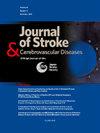中风后睡眠时间与长期死亡率:一项全国性分析
IF 1.8
4区 医学
Q3 NEUROSCIENCES
Journal of Stroke & Cerebrovascular Diseases
Pub Date : 2025-07-14
DOI:10.1016/j.jstrokecerebrovasdis.2025.108399
引用次数: 0
摘要
在美国心脏协会(American Heart Association)新的生命基本标准(Life 's Essential)中,睡眠时间是衡量理想心血管健康状况的一个关键指标,但对中风幸存者的结果的研究很少。我们在一个具有全国代表性的美国样本中评估了自我报告的中风幸存者的睡眠时间和死亡率之间的关系。方法将来自国家健康与营养检查调查数据库的横断面数据(2005-2018年)与2019年国家死亡指数相关联,这些数据来自年龄≥18岁(n= 42143)、自述卒中史(n= 1488)的患者,以确定夜间睡眠时间与死亡率之间的关系。评估睡眠时间(短:7小时,正常:7-8小时,长:8小时)与人口学特征之间的关系。通过多变量Cox回归,评估睡眠时间与死亡率(全因和心血管原因)之间的关系,调整人口统计学和临床变量。在中风幸存者中,睡眠时间短的患病率随着年龄的增长而增加,而睡眠时间长的患病率随着年龄的增长而增加(p<0.001)。在睡眠时间上没有明显的性别差异。在未调整的模型中,长睡眠时间与较高的全因死亡率相关(HR 1.82, 1.44-2.31, p<0.0001)。校正协变量后(HR 1.36, 1.08-1.71, p = 0.01),相关性减弱,但仍然显著(HR 1.30, 1.02-1.65, p = 0.03)。敏感性分析进一步验证了这一结论的可靠性。经校正分析,短睡眠时间与全因死亡率或心血管死亡率无关。长时间睡眠和心血管疾病死亡率之间没有明显的联系。结论长时间睡眠与卒中后高危险性全因死亡率独立相关。本文章由计算机程序翻译,如有差异,请以英文原文为准。
Sleep duration and long-term mortality after stroke: A nationwide analysis
Background
Sleep duration is a key marker of ideal cardiovascular health in the American Heart Association’s new Life’s Essential 8 construct, but studies on outcomes in stroke survivors are scarce. We assessed the association between sleep duration and mortality among self-reported stroke survivors in a nationally representative U.S. sample.
Methods
Cross-sectional data (2005–2018) from the National Health and Nutrition Examination Surveys database in patients aged ≥18 (n=42,143) with a self-reported history of stroke (n=1,488) were linked to the 2019 National Death Index to determine the association between nightly sleep duration and mortality. Relationships between sleep duration (short: <7 hrs, normal: 7-8 hrs, long: >8 hrs) and demographic characteristics were assessed. Relationships between sleep duration and mortality (all-cause and cardiovascular causes) were evaluated adjusting for demographic and clinical variables, with multivariable Cox regressions.
Results
Among stroke survivors, prevalence of short sleep duration increased with younger age while prevalence of long sleep duration increased with older age (p<0.001). There were no significant sex differences in sleep duration. Long sleep duration was associated with higher all-cause mortality in the unadjusted model (HR 1.82, 1.44-2.31, p<0.0001). After adjustment for co-variates, (HR 1.36, 1.08-1.71, p = 0.01), the association attenuated, but remained significant (HR 1.30, 1.02-1.65, p = 0.03). Sensitivity analysis further verified the reliability of this conclusion. Short sleep duration was not associated with all-cause or cardiovascular mortality after adjusted analyses. There were no significant associations between long sleep duration and cardiovascular mortality.
Conclusion
Long sleep duration is independently associated with higher risk, all-cause mortality after stroke.
求助全文
通过发布文献求助,成功后即可免费获取论文全文。
去求助
来源期刊

Journal of Stroke & Cerebrovascular Diseases
Medicine-Surgery
CiteScore
5.00
自引率
4.00%
发文量
583
审稿时长
62 days
期刊介绍:
The Journal of Stroke & Cerebrovascular Diseases publishes original papers on basic and clinical science related to the fields of stroke and cerebrovascular diseases. The Journal also features review articles, controversies, methods and technical notes, selected case reports and other original articles of special nature. Its editorial mission is to focus on prevention and repair of cerebrovascular disease. Clinical papers emphasize medical and surgical aspects of stroke, clinical trials and design, epidemiology, stroke care delivery systems and outcomes, imaging sciences and rehabilitation of stroke. The Journal will be of special interest to specialists involved in caring for patients with cerebrovascular disease, including neurologists, neurosurgeons and cardiologists.
 求助内容:
求助内容: 应助结果提醒方式:
应助结果提醒方式:


